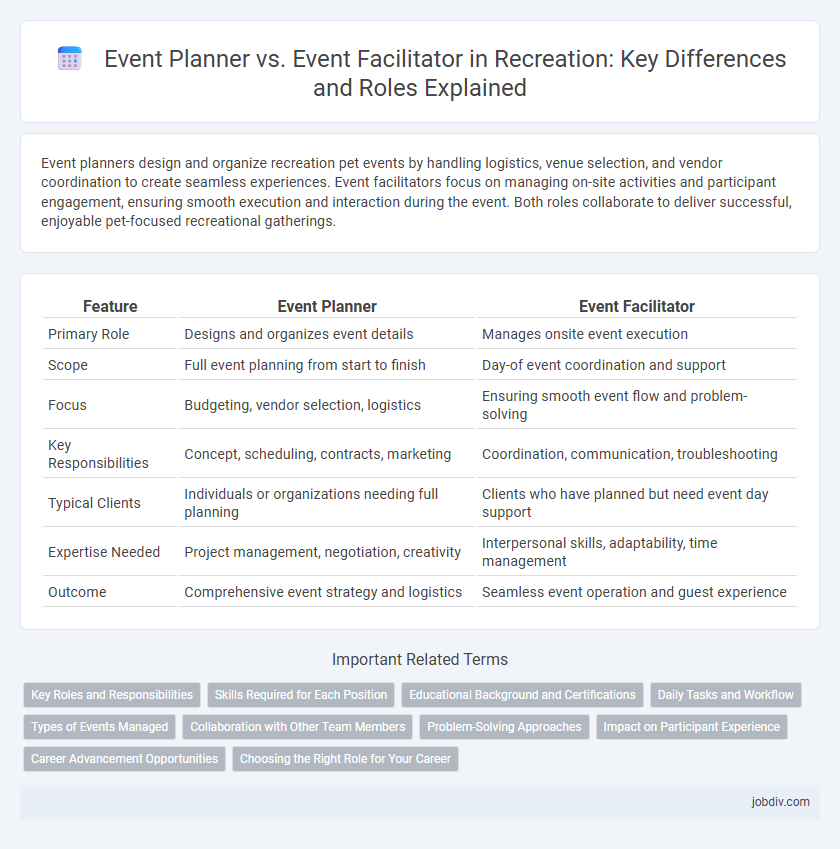Event planners design and organize recreation pet events by handling logistics, venue selection, and vendor coordination to create seamless experiences. Event facilitators focus on managing on-site activities and participant engagement, ensuring smooth execution and interaction during the event. Both roles collaborate to deliver successful, enjoyable pet-focused recreational gatherings.
Table of Comparison
| Feature | Event Planner | Event Facilitator |
|---|---|---|
| Primary Role | Designs and organizes event details | Manages onsite event execution |
| Scope | Full event planning from start to finish | Day-of event coordination and support |
| Focus | Budgeting, vendor selection, logistics | Ensuring smooth event flow and problem-solving |
| Key Responsibilities | Concept, scheduling, contracts, marketing | Coordination, communication, troubleshooting |
| Typical Clients | Individuals or organizations needing full planning | Clients who have planned but need event day support |
| Expertise Needed | Project management, negotiation, creativity | Interpersonal skills, adaptability, time management |
| Outcome | Comprehensive event strategy and logistics | Seamless event operation and guest experience |
Key Roles and Responsibilities
Event planners coordinate all logistical aspects of recreation events, including venue selection, vendor management, budgeting, and scheduling to ensure smooth execution. Event facilitators focus on leading and managing event activities, engaging participants, and resolving on-site issues to maintain a positive experience. Both roles collaborate to deliver successful recreation programs, with planners handling preparation and facilitators guiding real-time event dynamics.
Skills Required for Each Position
Event planners require strong organizational skills, expertise in budgeting, vendor negotiation, and detailed scheduling to ensure seamless event execution. Event facilitators excel in interpersonal communication, conflict resolution, and real-time problem-solving to guide activities and maintain participant engagement. Both roles demand adaptability and time management but focus on different skill sets aligned with their distinct responsibilities.
Educational Background and Certifications
Event planners typically hold degrees in hospitality management, marketing, or business administration, complemented by certifications such as Certified Meeting Professional (CMP) or Certified Special Events Professional (CSEP). Event facilitators often pursue specialized training in communication, conflict resolution, or instructional design, with certifications including Certified Professional Facilitator (CPF) or Advanced Facilitation Skills credentials. Both roles require a strong foundation in organizational skills but differ in educational focus and certification that align with their distinct responsibilities in recreation event management.
Daily Tasks and Workflow
Event planners coordinate logistics by booking venues, managing vendor contracts, and creating event timelines to ensure seamless execution. Event facilitators focus on onsite management, guiding attendees, troubleshooting issues, and facilitating communication between participants and staff throughout the event. Both roles require detailed organization and real-time problem-solving to deliver successful recreational experiences.
Types of Events Managed
Event planners typically manage large-scale events such as weddings, corporate conferences, and trade shows, coordinating logistics, vendor contracts, and detailed schedules. Event facilitators focus on interactive and participation-driven gatherings like workshops, team-building activities, and community forums, ensuring smooth communication and engagement among attendees. Both roles require adapting to unique event types but differ in their emphasis on structure versus participant interaction.
Collaboration with Other Team Members
Event planners coordinate logistics, timelines, and vendor communications to ensure seamless execution, while event facilitators focus on managing on-site activities and attendee engagement to enhance the experience. Collaboration between event planners and facilitators promotes effective communication, quick problem-solving, and adaptive management during events. Both roles require strong teamwork with marketing, production, and catering teams to align goals and optimize client satisfaction.
Problem-Solving Approaches
Event planners utilize structured project management techniques to anticipate and mitigate potential issues before they arise, ensuring seamless event execution. Event facilitators emphasize adaptive problem-solving during the event, fostering real-time collaboration and quick decision-making among participants. Both roles leverage distinct approaches to resolve conflicts and operational challenges, optimizing overall event success.
Impact on Participant Experience
An event planner shapes the participant experience by meticulously organizing logistics, ensuring smooth scheduling, venue selection, and vendor coordination to create a seamless event flow. An event facilitator directly impacts engagement by guiding interactions, fostering communication, and adapting activities in real-time to maintain participant interest and collaboration. The synergy between planner precision and facilitator responsiveness enhances overall attendee satisfaction, making events more immersive and memorable.
Career Advancement Opportunities
Event planners typically advance by managing larger-scale or high-profile events, gaining expertise in budgeting, vendor negotiations, and client relations, which positions them for leadership roles such as Event Director or Conference Manager. Event facilitators often progress by developing specialized skills in group dynamics, conflict resolution, and interactive engagement, leading to opportunities as Workshop Coordinators or Corporate Training Specialists. Both career paths offer growth through certification programs like CMP (Certified Meeting Professional) for planners or ICAgile Facilitation certifications for facilitators.
Choosing the Right Role for Your Career
Event planners primarily manage logistics, budgeting, and vendor coordination to ensure a seamless event, while event facilitators focus on guiding group interactions and enhancing participant engagement during the event. Selecting the right career depends on your strengths: organizational skills and attention to detail align with event planning, whereas strong interpersonal and communication skills suit event facilitation. Understanding industry demands shows event planners often work in corporate, wedding, or large-scale settings, whereas facilitators thrive in workshops, training sessions, and community gatherings.
Event Planner vs Event Facilitator Infographic

 jobdiv.com
jobdiv.com